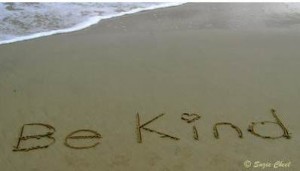“Be kind, for everyone you meet is fighting a hard battle.” -- Plato
Cases of extreme violence, like the gang-rape of a 23-year old medical student in New Delhi, India (http://www.cbc.ca/news/world/story/2013/01/21/india-rape-fast-track-court.html), always seem to cause waves of public outrage and protest around the world. Days after a high-profile rape is reported, the world seems to be calling for an end to sexual harassment and assault. Posters are plastered across a city hours after a young child is kidnapped. In times of adversity, the masses always seem to demand strict enforcement of laws by authorities. The anger and sense of justice that seem to awaken in the general public following a tragedy is strangely uplifting. There’s something so powerful about the entangled voices of complete strangers, fighting for the common good. It makes me question why the objections and intolerance of injustice die down once time has passed and the cries of the fallen have faded away. Somehow we can rationalize sitting back and doing nothing because these events have occurred across the world in other countries. But we often forget that violence occurs everyday, even on UofT’s relatively safe campus. A boyfriend slaps his girlfriend. A young student is humiliated online. A weapon is concealed. Must we wait for something bad to happen in order to marvel at the state of world and its affairs? Is there anything we can do? The Green Dot Program at UofT is about caring. It’s about refusing to passively accept that so many people are getting hurt. And most of all, it’s about believing that we all have a responsibility to create a safer campus and world. The Green Dot Program encourages everyone to focus on reducing the risk of violence in the moment, even if the threat of violence isn’t imminent (http://www.healthandwellness.utoronto.ca/GreenDot.htm). A green dot is any behaviour, action, word, or attitude that promotes safety for us all. It can be as simple as spilling a drink if you believe it’s drugged. Or asking someone who appears to be in trouble if they’re okay. No action is too small.
We tend to think that this only happens to other people. That it’s none of our business. But Cheryl Champagne, the Assault Counsellor and Co-ordinator of the Green Dot strategy at UofT, disagrees. She says that in every group or classroom that she has talked to about the Green Dot Program anywhere from 40-90% of students in the room have experienced violence or have known someone who has. And that makes it all of our business. What’s more, Cheryl says that in those instances of violence, when asked how often there was a bystander, someone who could have actually done something to prevent violence, more than 50% of students raise their hands. Imagine that. A lot of what is happening is actually preventable.
Why do we hesitate to take a stand? Is it because we don’t care? I find that hard to believe. Is it because we’re scared for our safety? Perhaps. Whatever our reason, we have to realize that if we don’t do anything, nothing will change. Like the people rallying in India, we too must rally even in the day-to-day acts of kindness. The green dots.
The Green Dot Program at UofT is about caring. It’s about refusing to passively accept that so many people are getting hurt. And most of all, it’s about believing that we all have a responsibility to create a safer campus and world. The Green Dot Program encourages everyone to focus on reducing the risk of violence in the moment, even if the threat of violence isn’t imminent (http://www.healthandwellness.utoronto.ca/GreenDot.htm). A green dot is any behaviour, action, word, or attitude that promotes safety for us all. It can be as simple as spilling a drink if you believe it’s drugged. Or asking someone who appears to be in trouble if they’re okay. No action is too small.
We tend to think that this only happens to other people. That it’s none of our business. But Cheryl Champagne, the Assault Counsellor and Co-ordinator of the Green Dot strategy at UofT, disagrees. She says that in every group or classroom that she has talked to about the Green Dot Program anywhere from 40-90% of students in the room have experienced violence or have known someone who has. And that makes it all of our business. What’s more, Cheryl says that in those instances of violence, when asked how often there was a bystander, someone who could have actually done something to prevent violence, more than 50% of students raise their hands. Imagine that. A lot of what is happening is actually preventable.
Why do we hesitate to take a stand? Is it because we don’t care? I find that hard to believe. Is it because we’re scared for our safety? Perhaps. Whatever our reason, we have to realize that if we don’t do anything, nothing will change. Like the people rallying in India, we too must rally even in the day-to-day acts of kindness. The green dots.
 You can start by learning more about how to be an active bystander and stay safe through Green Dot talks and training (http://www.healthandwellness.utoronto.ca/GreenDot/Events.htm).
You can watch the Green Dot video and be inspired by students who care (http://www.healthandwellness.utoronto.ca/GreenDot.htm).
Or you can complete the “What Would You Do?” survey online (http://ca.studentvoice.com/uot/gdwk2013whatwouldyoudo).
And you never know what your green dot will do. The chain of events it will set in place. Maybe your green dot will make someone smile. Or remind someone that they’re not alone. Maybe it will stop a fight. Or save a life. Whatever the situation, you can be certain of one thing: you weren’t a bystander. Someone who watched from the sideline. Someone who took the easy way out. No, you were a green dot. You helped to replace a moment of violence with a moment of support and safely, reducing the number of red dots in the world. And that’s a good feeling.
Plato knew what he was talking about. Always remember to take care of yourself. But don’t forget to take care of those around you. What’s your green dot?
Till next week,
Ishita
You can start by learning more about how to be an active bystander and stay safe through Green Dot talks and training (http://www.healthandwellness.utoronto.ca/GreenDot/Events.htm).
You can watch the Green Dot video and be inspired by students who care (http://www.healthandwellness.utoronto.ca/GreenDot.htm).
Or you can complete the “What Would You Do?” survey online (http://ca.studentvoice.com/uot/gdwk2013whatwouldyoudo).
And you never know what your green dot will do. The chain of events it will set in place. Maybe your green dot will make someone smile. Or remind someone that they’re not alone. Maybe it will stop a fight. Or save a life. Whatever the situation, you can be certain of one thing: you weren’t a bystander. Someone who watched from the sideline. Someone who took the easy way out. No, you were a green dot. You helped to replace a moment of violence with a moment of support and safely, reducing the number of red dots in the world. And that’s a good feeling.
Plato knew what he was talking about. Always remember to take care of yourself. But don’t forget to take care of those around you. What’s your green dot?
Till next week,
Ishita
0 comments on “Those Who Do Not Learn From History Are Doomed To Repeat It”